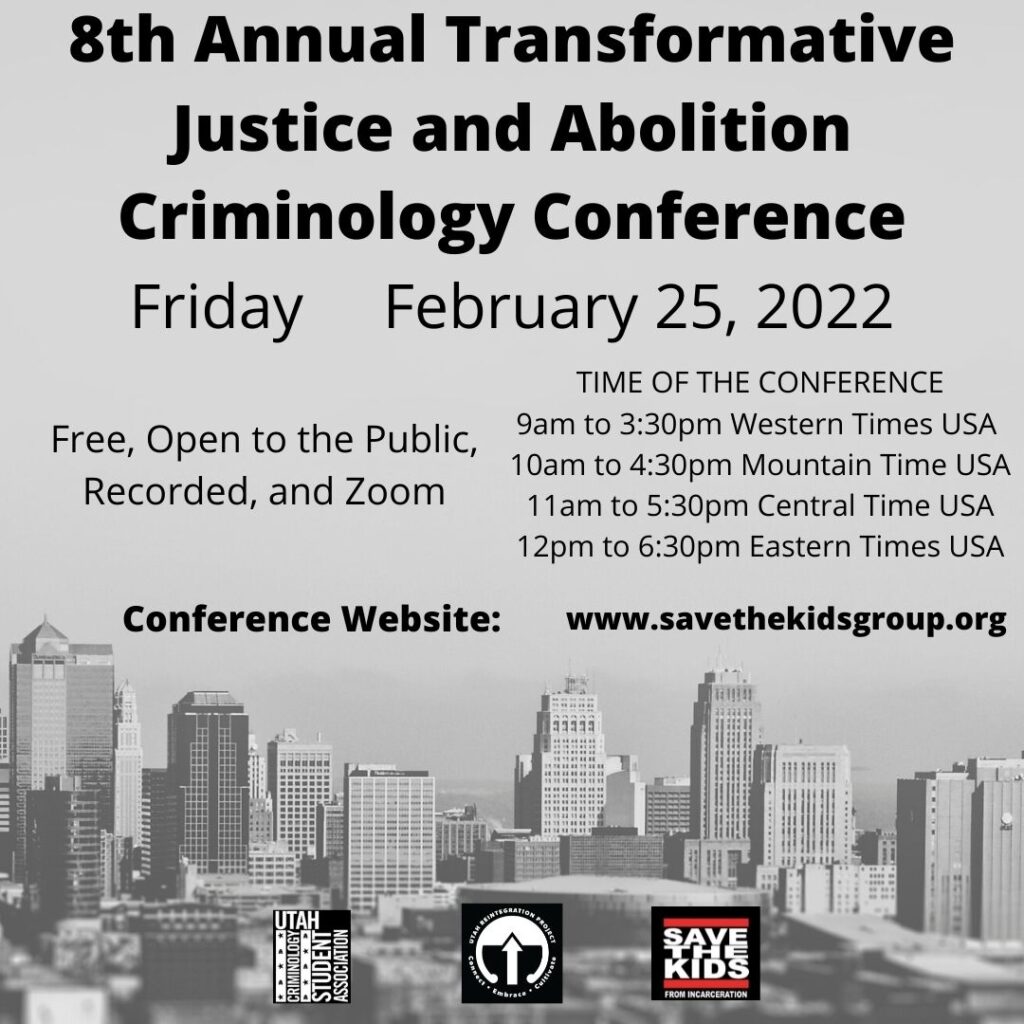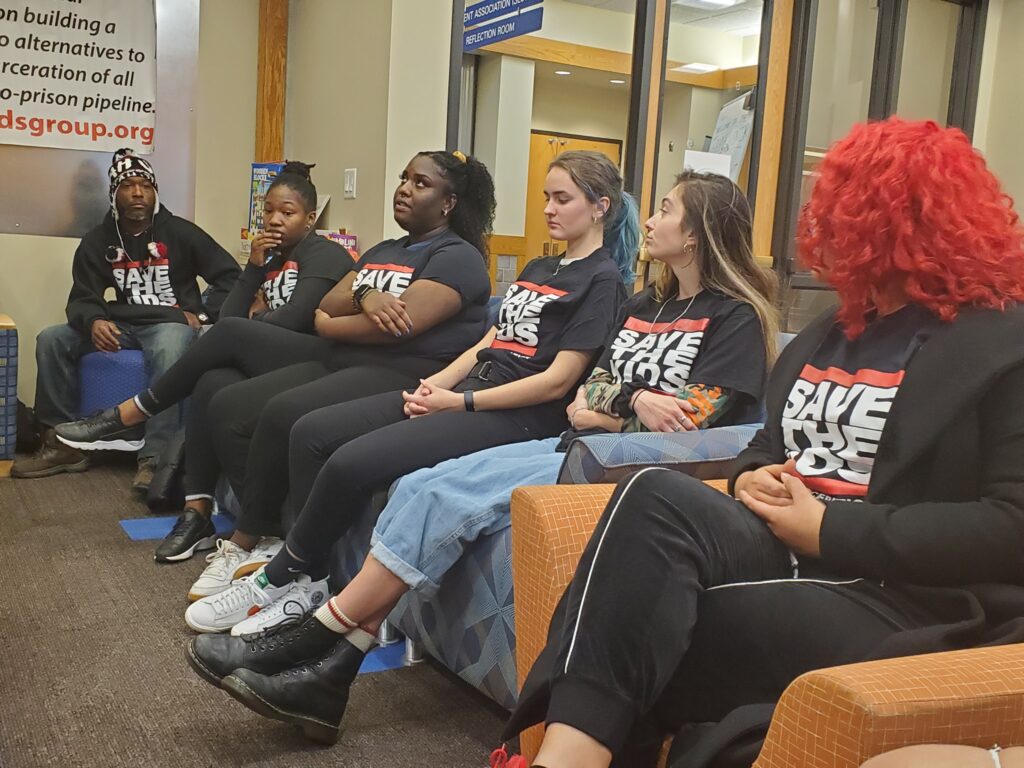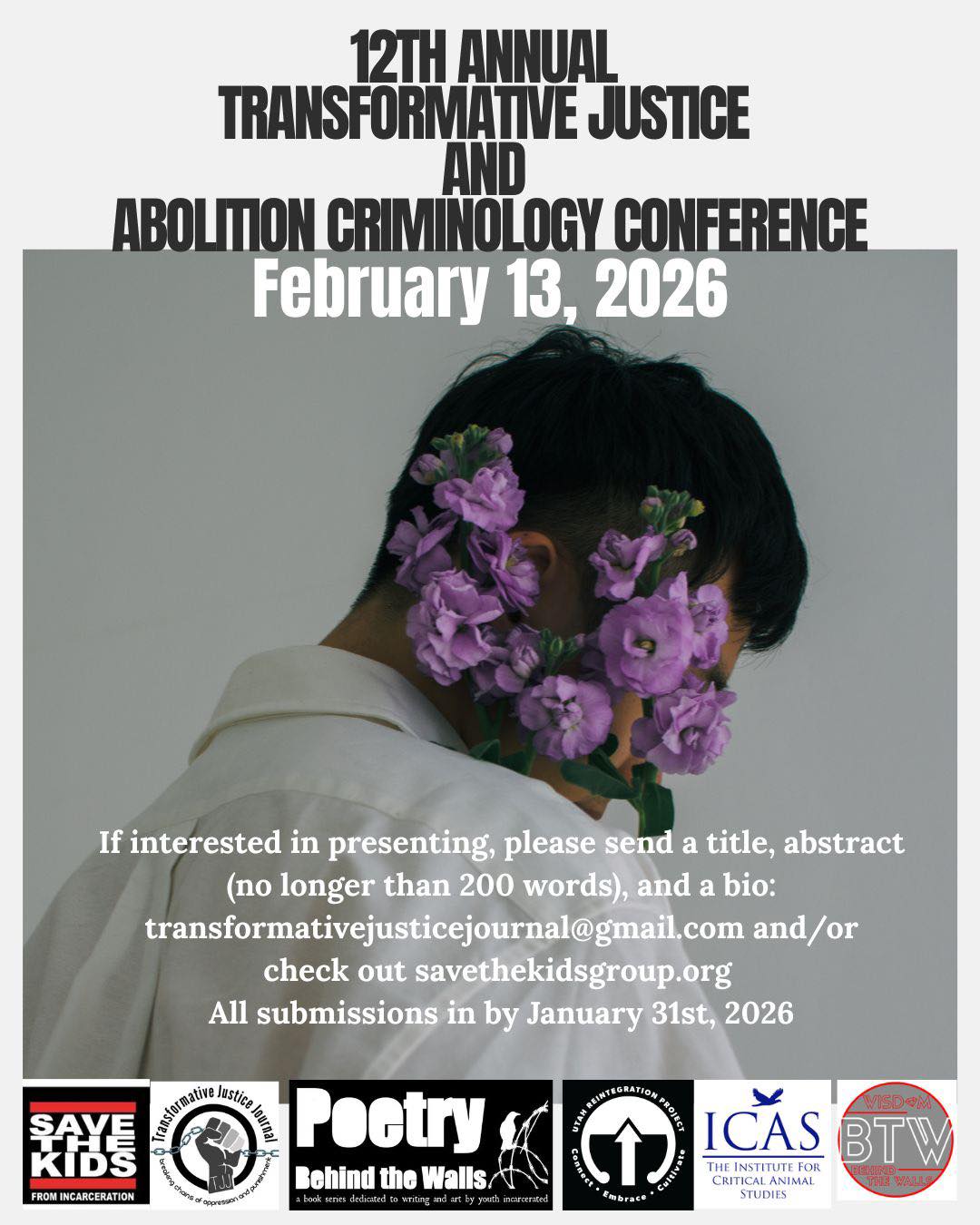8th Annual Transformative Justice and Abolition Criminology Conference
Friday, February 25, 2022

TIME OF THE CONFERENCE
9am to 3:30pm Western Times USA
10am to 4:30pm Mountain Time USA
11am to 5:30pm Central Time USA
12pm to 6:30pm Eastern Times USA
Register in advance for this webinar:
https://slcc-edu.zoom.us/webinar/register/WN_OvRkm0P5QoGFLQB5dRxDig
Free, Open to the Public, and Recorded
Co-Chaired by
Lucas Alan Dietsche
lucasdietsche81@gmail.com
AND
Cynthia Mellin, President, Utah Criminology Student Association
SCHEDULE
(Mountain Time USA is the time zone that we will be following).
10:00am to 10:20am – Welcoming and Overview
Lucas Alan Dietsche, Save the Kids and Cynthia Mellin, President, Utah Criminology Student Association
10:30am to 10:50am – Transformative Justice: An Approach Glance to a Larger Concept for K-12 Educatators
Presenter: Hailey King
Abstract: Transformative justice is an academic concept that can feel largely unapproachable to many educators, especially in the K-12 sector. If the past two years have shown people anything, it is the weight of influence of the education system. In such an environment coupled with political divisiveness and mental health decline of children and teens, the systems in place have been burdened with the consequences of their ineffectively. The integration of a wholistic transformative justice curriculum into K-12 schools to solve for portions of such issues at first seems daunting, but through small changes in practice and large changes in mentalities by educators and councilors it becomes more approachable.
Biography: Hailey King is a high school student at Oak Ridge High School and is skilled in organizing, leadership, and planning. She is a passionate triathlete that enjoys challenging herself. Currently working on researching restorative and transformative justice’s use in high school, she dedicates herself to research and learning new things. She is unwavering in her belief in ensuring equality in education, advancing LGBTQ+ rights, and racial justice. She plans to go to university to pursue a doctorate in public policy in order to ensure an education system that works to support all people.
10:50am to 11:00am – Q & A
11:00am to 11:20am – Analysis of Transformative Justice on Social Media: Twitter Use and Users by Gender
Presenter: Azzurra Crispino
Abstract: The term ‘transformative justice’ (TJ) appears to be in use since the 1980s, but there does not seem to be a clear author or coinage of the term. The term may have begun in activist circles, where there appears to be hesitancy towards its formalization. This article is a preliminary analysis of how the term ‘transformative justice’ is used on twitter, with two main purposes: to see whether there is a variance in the gender of the users using the term using quantitative methods and to do an initial coding of how the term is being used in the field using qualitative methods. The findings were that women are more likely to use the term than men, and that people who identified as gender non-binary/trans were also more likely to use the term than men. It would appear that those who are questioning traditional masculinist views of punishment are also statistically more likely to question gender more broadly. The qualitative methods showed that the undisputed features of transformative justice were accountability, dealing with the root causes of the harm in order to prevent future harm, supporting survivors, growth for the perpetrators, seeing people as more than the harm they have caused and that harm itself should be viewed in its broader context and addressed by dismantling oppressive systems. Some disputed features of transformative justice were whether it can be used in a state context, whether it can include violence against the perpetrator, and whether it should be formalized at all.
Biography: Azzurra Crispino is an Associate Professor of Philosophy at Austin Community College and a PhD student in Sociology at Texas A&M University. She is the co-Founder of PAPS (Prison Abolition Prisoner Support), a pen pal to incarcerated people and peaceful protest organization. She is a contributing author to Real Drugs in a Virtual World.
11:20am to 11:30am – Q & A
11:30am to 11:50am – Abolishing Mass Incarceration Using the 13th Amendment: The Badges and Incidents of Slavery
Presenter: Andy Hope Williams Jr.
Abstract: The Evolution of Prisons in America has always been about controlling the Black body and profiting off free labor. Indeed, modern day prisons evolved and nurtured by white supremacy; its roots are found in slavery. Prisons today continue to profit off of slave labor and the Constitution allows it. But a string of U.S. Supreme Court rulings involving the Thirteenth Amendment offers Congress a tool with which to target institutions that have preserved social, political, and official norms associated with slavery. In those cases, the Supreme Court held that Congress has broad enforcement authority under the Thirteenth Amendment to eliminate such “badges and incidents” of slavery. It is time to call modern day prisons what they are: a badge and incident of slavery that Congress has the power to abolish under the Thirteenth Amendment.
Biography: Andy Hope Williams Jr., is a graduate with a bachelor’s in paralegal studies from Lewis University-Romeoville, Illinois. He resurrected the Democratic-Republican Party, a National Political Party focused on ensuring freedom, liberty, and justice for all. He also was a 2020 Presidential Candidate. He has extensive research on slavery, politics, and the 13th Amendment. He has pending litigation against the United States and 32 other states to end the exception clause in the Constitution that allows a person to be deemed a slave if they have been duly convicted of a crime. You can learn more about his vision at: www.hoodcandidate.com
11:50am to 12:00pm – Q & A
12:00pm to 12:20pm – I Can’t Remember Anything Because I was in !!**%!!$!!?*!!! Prison For a Couple Decades and it Ate My Brain
Presenter: Cathee Tkachuk
Abstract: The carceral continuum is alive and present. Cathee will tell us how the carceral follows parolees and what experiences they have in it’s presence. Incarceration doesn’t stop at the door or even after you’ve finished parole, but continues with you always. Cathee will be speaking about her personal experience as well as citing experiences her fellow parolees have gone or are going through .She will be exploring how sleep patterns are affected in the aftermath of constant bed checks, how language is affected by having to use prison slang and governmental acronyms, and how triggers affect your abilities to communicate, make decisions and maintain emotional “norms”, and how fear of everything manifests in parolees.
Biography: Cathee is a 54 year old woman with twenty two years of lived experience in the prison system.. She’s been recently paroled and is navigating her way through her community of Vancouver BC. Cathee has written short stories, poems and a prison dictionary, circa 2013. Cathee just enrolled in college with her sights on an eventual PhD in anthropology. She is the BC coordinator of the Walls to Bridges Program Collective which specializes in the gargantuan task of bringing university classes into prisons. Cathee works in a SRO with clients who reside in Vancouver’s downtown east side.
12:20pm to 12:30pm – Q & A
12:30pm to 12:50pm –Transformative Justice through Experiential Learning: Lessons Learned from a Pen Paling Project with Incarcerated Individuals
Presenter: Daniela Jauk
Abstract: College students engaged in one-on-one letter conversations with their inside pen pals and completed a variety of group and individual reflections assignments throughout the course of the semester. While initially apprehensive, students reacted overwhelmingly positive and enthusiastic about the hands-on opportunity to break through the smokescreen of media-infused stereotypes of incarcerated people and their reflections demonstrated that they experienced deep connections and a “humanizing” of incarcerated folks. Students reported that they gained an in-depth understanding of deeply rooted structural issues in the U.S. criminal justice system. About half of the students continued the pen paling after the class, at least two students chose to visit their pen pals in person. While this paper is not a systematic evaluation of reflections accounts, it will feature exemplary quotes from students and present lessons learned in terms of class logistics, as well as lay out the further research plan.
Bio: Daniela Jauk, PhD, is Assistant Professor for Sociology and Criminal Justice at the University of Akron, Ohio. She received a Masters in Sociology from the University of Graz in her home country Austria and completed her Ph.D. in Sociology as a Fulbright student at the University of Akron/OH in 2013. Her areas of research interest and teaching are gender and sexualities, inequality in the criminal justice system, and qualitative methods. She is currently working on clinical sociology projects and research around gardening in carceral settings.
12:50pm to 1:00pm – Q & A
1:00pm to 1:20pm – Humanewashing of Israel’s Human and Animal Rights Abuses
Presenter: Yulia Gilich
Abstract: The Israeli-Palestinian conflict unfolds not only on the ground but also in the public discourse. Israel’s government actively engages in public diplomacy campaigns designed to improve the state’s reputation. To stifle the growing criticism of its military occupation of Palestine, Israel projects an image of a compassionate nation striving for peace. In this chapter, I examine how non-human animals rhetorically function in Israel’s state narrative. I argue that Israel promotes an appearance of being an animal welfare champion – a tactic I call “humanewashing.” To reconcile the rhetoric of compassion with the reality of enacting state violence against Palestinians, Israel portrays them as being especially cruel to animals, conjuring the racist stereotype of the “barbaric Palestinian.” In so doing, Israel humanewashes its human and animal rights abuses.
Biography: Yulia Gilich is a media scholar, artist, and community organizer. They are a PhD candidate in the Department of Film & Digital Media at UC Santa Cruz. Their work is primarily concerned with the use of settler colonization in larger imperial projects, particularly those of the United States and Israel.
1:20pm to 1:30pm – Q & A
1:30pm to 1:50pm – Covid, zineology, and auto-authenticity
Presenter: Lucas Alan Dietsche
Abstract: Like all academic research, prison zines are materials in transition and reflection on the current epoch written. Research presents us on how prison zines are created as a catch-all to alternatives to media, prisoner-created political tracts, and auto-ethnographies as a genre of medium in criminology. During Covid pandemic with much academic dialogue and presentation on Zoom or zoom-like sites, alienation of the screen creating zoom fatigue, anxiety, depression, etc has been documented. Since zines are interactive without immediate interaction, discussing zines through academic spaces can seek to de-alienate and transform mental spaces as a ” 2-D.5″ interaction-medium.
Biography: Lucas Alan Dietsche is a graduate of Criminology/Criminal Justice and member of the Division of Convict Criminology. He is the Editor of the Transformative Justice Journal and Co-Facilitator of the National U.S. Prisoner Reintegration Conference. He is an adjunct professor for print-based correspondence prison courses. He has many articles published on Poetic Inquiry Criminology, zineology, and carceral feminism. Currently living in West Duluth, Minnesota he has published works such as “Word Out”, “Elba”, “Commies and Zombies”, “Since the Oregon Trail”, “Moods are Like Wisconsin Weather”,and “Kapshida.” He has published poetry in Transformative Justice Journal, Ariel Anthology, Poetry Behind the Walls, and Nemadji Review. He has a patreon/blog called “Pilot of Oumuamua”. His email is lucasdietsche81@gmail.com
1:50pm to 2:00pm – Q & A
2:00pm to 2:20pm – School to Prison Pipeline
Presenter: Reece Graham-Bey
Abstract: This presentation will focus on the school to prison pipeline and the work that Save the Kids does in the community on a national level. Save the Kids is a full-volunteer grass-roots organization compared to a corporate nonprofit model. This presentation will also discussion how service on a grass-roots community level looks different than a formal professional organization.
Biography: Reece Graham-Bey is a son, brother, uncle, nephew and friend to people who deserve better than what they receive from our justice system. In the twenty-five years since his encounter as a youth with the criminal justice system he has become a leadership development mentor, non-violent communication and alternative to violence training facilitator, and advocate for transformative justice. He resides in Seattle and sits on the boards of the Alternatives to Violence Project and Projects for a Civil Society, Communities of Belonging, and serves as interim director of environmental justice actions with Northwest Save The Kids from Incarceration (STK).
2:20pm to 2:30pm – Q & A
2:30pm to 2:50pm – Moving from Inclusivity to Justice
Presenter: Peter Moosman
Abstract: Visibility and inclusivity aren’t going to save us. It is time challenge these concepts and move toward justice. Let us talk about essentials to address cultural and systemic shifts towards true liberation.
Biography: Peter Moosman (He/They/Peter) runs the Salt Lake Community College Gender & Sexuality Student Resource Center (GSSRC). As a first-generation college graduate from Davis County, Utah, he has been with SLCC for over eleven years. After proudly graduating from SLCC with degrees in Humanities and Political Science, he later graduated from Weber State University with a degree in Civic Advocacy, where he focused his research on gender in traditional Native American cultures, cognitive dissonance of gay identities in Mormonism, and First Amendment law. When not at work, Peter focuses much of his energy on activism and awareness. Volunteering for organizations like Equality Utah, the Boys & Girls Club, and the American Red Cross, he is dedicated to helping improve the lives of those around him. His most notable community project is his “Hug A Gay Mormon” ministry, where he would engage the community in essential conversation and reflection surrounding the intersecting identities of being Queer and a member of the Church of Jesus Christ of Latter-day Saints. He has received various awards, including Advocate of the Year and Lifetime Achievement in Advocacy awards by the Utah Phoenix Alliance, and the SLCC Presidential Award for Community Engaged Staff. He and his GSSRC team won the 2020 SLCC Unsung Sheroes Award in their first year of operation and he helped SLCC achieve the ranking of the “most affordable LGBTQ-friendly college in the US” and the “top 8 community colleges leading the nation in LGBTQ Equity” in 2021.
2:50pm to 3:00pm – Q & A
3:00pm to 3:20pm – Care and Crisis in David Graeber’s New York: Anarcha-Feminism and Mutual Aid
Presenter: Caroline Kaltefleiter
Abstract: The scholarship and life experiences of David Graeber provide a context to investigate the notion of care during crises. The COVID-19 global pandemic serves as a critical flashpoint to explore concepts such as gift economies and mutual aid, as noted throughout his work. Through a trajectory of historiography and autoethnography, I examine the significance of anarcha-feminism embodied by and through that of Emma Goldman, as significant to anarchist practices that reverberate in Graeber’s life and work. I therefore introduce a theoretical concept of phantom power to describe this phenomenon. Further, I situate anarcha-feminism within collectives of care and relate this work to anarchist interventions such as Occupy. I argue that Graeber’s anarchist framework for Occupy provided the foundation for contemporary mutual aid groups in New York that were active not only during the pandemic but, importantly, to ongoing mutual aid and direct action projects. Finally, I acknowledge this article to be an engagement with the phenomenology of David Graeber, who remains influential in my research, teaching, and activism.
Biography: Caroline K. Kaltefleiter is Professor of Communication Studies Media Studies and is the Director of the Anarchist Studies Initiative at the State University of New York at Cortland. She is the author of “Anarchy Girl Style Now: Riot Grrrl Actions and Practices” in the Contemporary Anarchist Studies: An Introductory Anthology of Anarchy in the Academy. She is also the author of “Save Care and Black Girls Saving Themselves” In The Black Girlhood Studies Collection. Her upcoming publication and tribute to the late David Graeber titled, “Care and Crisis in David Graeber’s New York: Anarcha-Feminism, Gift Economies, and Mutual Aid Beyond a Global Pandemic” will appear in the journal Anthropological Notebooks later this year. Having been a member of the Positive Force Anarchist Collective and Riot Grrrl D.C., she’s written numerous articles and papers on anarcha-feminism, girls’ media production and activism over the last two decades. Her activist work includes Occupy Wall Street and various Mutual Aid Projects in Upstate New York. She is currently editing book series for Active Distribution on Punk and Anarchism, including the first title Smash the System: Punk Anarchism as a Culture of Resistance due out in 2022.
3:20pm to 3:30pm – Q & A
3:30pm to 3:50pm – White Veganism’s Entanglement with Racial and Carceral Capitalism Presenter: Zane McNeill
Abstract: In a Civil Eats article, journalist Charlie Mitchell explains that a long running critique of the vegan movement concerns its centering of whiteness, that is, being largely staffed by white management and carrying out the campaigns determined by white funders. Despite Black Americans being more likely to be vegan, the mainstream vegan movement, also known as white veganism, has centered and funded white voices, propagated racist rhetorical campaigns, and harmed precarious Latinx communities through punitive justice campaigns. The carceral logics behind the objectives and campaigns of groups like HSUS, ASPCA, and ALDF illustrate that these groups, and the mainstream vegan movement as a whole, viewed BBIPOC as obstacles and villains in the fight for animal liberation. This disposability of BBIPOC by white vegan groups is informed by its embeddedness in the systems of racial and carceral capitalism which exploits and marginalized peoples.
Biography: Zane McNeill is a scholar-activist with a BA in History and MA in Political Science. He is an experienced organizer and has worked in the spheres of public policy, government relations, and animal law in the non-profit sector. They are the co-editor of Queer and Trans Voices: Achieving Liberation Through Consistent Anti-Oppression and are currently working on other projects concerning queer liberation in Appalachia, anti-carceral veganism, choreopolitics, and socially engaged art. You can contact him at rootsdeiconsultingandpolicy@gmail.com.
3:50pm to 4:00pm – Q & A
4:30pm to 4:20pm – How Can We Reimage Our Criminal Legal System?
Presenter: Billy Palmer
Abstract: This presentation will be focusing on racial disparities in arrests and incarceration in the state of Utah, USA.
Biography: Billy Palmer joined the ACLU of Utah as a Community Organizer in January of this year after spending five years as a host and associate producer of the public affairs show RadioACTive on KRCL 90.9 FM. While at KRCL, he also served as the Director of Civic Engagement. Billy also has a background in filmmaking, music promotion, as well as swing dance performance and choreography. Billy has 20 years of experiance in activism and grassroots movement building on a local and national level. Among many focuses he has worked around issues of economic equality, human rights, gender equity, anti-black and indigenous policy, youth empowerment, and advocacy for survivors of sexual assault and domestic abuse. A resident of Salt Lake City’s Westside, and father of three adult children, Billy enjoys spending time with family, live performances of many sorts, film festivals and traveling as often as possible.
4:20pm to 4:30pm Q & A

![Official Statement – Save the Kids Official Statement on the organization – Save The Children [Fund]](https://savethekidsgroup.org/wp-content/uploads/2019/11/Save-the-Kids-Official-Statement-header.jpg)


